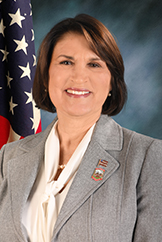
Senator Turner, a lifelong resident of Illinois and graduate of the University of Illinois Urbana-Champaign where she earned a degree in legal studies, worked as a juvenile probation officer before serving six years as a paralegal in the Office of the Logan County State’s Attorney. Her public service career began in 1994, when she was elected as Logan County Clerk and Recorder followed by five more consecutive re-elections. In her role as Senator, she serves on the following committees: Tourism and Hospitality (Minority Spokesperson); Ethics; Higher Education; Human Rights; Public Safety; Revenue; State Government; App-Education; App-Health; App- State Law Enforcement; App- Criminal Justice; Redistricting- West Central IL; Credits, Deductions, and Exemptions.
1. Looking back on your first year in the General Assembly, what are your biggest lessons? What are you most proud of?
Looking back on my first year as a State Senator, I’ve learned that things don’t really run as smoothly as I had anticipated. Session, committees, and meeting times fluctuate each day. There is little to no consistency in our daily schedule. I am thankful for the amazing staff I have that help manage constant changes.
So far, I’m most proud of the outreach and our teams’ ability to pass along information to the constituents of our district. My staff and I work hard to help those needing guidance get through all of the ‘red tape’ and issues that they run into with the various state agencies.
2. What are the biggest challenges facing your constituents related to higher education access affordability, and completion? How can the state and institutions help address those concerns?
There is one main challenge I continually hear from constituents when it comes to challenges related to accessing higher education – cost. They are concerned with the overall cost of higher education in terms of tuition and loans, but also the burden of paying for housing at institutions of higher education. This has been a concern not just within my district but the entire nation, which doesn’t appear to have an easy solution.
3. As a member of the Senate Higher Education Committee, what are your greatest hopes for Illinois higher education?
I look forward to building off the work and progress the Senate Higher Education Committee made during my first year. I have also been amazed by the great strides institutions within my district have made on new programs related to new innovations in solar and wind energy, and electric vehicles. I hope that our committee can help ensure those programs continue to grow.
4. How can advocates work with you to help achieve your vision for higher education during this session and beyond?
The best way for advocates of higher education to achieve their goals and help make higher education better in Illinois for everyone is to take a proactive approach. Make sure that your opinions are known even on the little things. Continued communication throughout the year, not just when we are in session, is vital to getting an agenda passed through the General Assembly.
Read the September 2022 issue of PCC’s Higher Ed Policy Quarterly.

